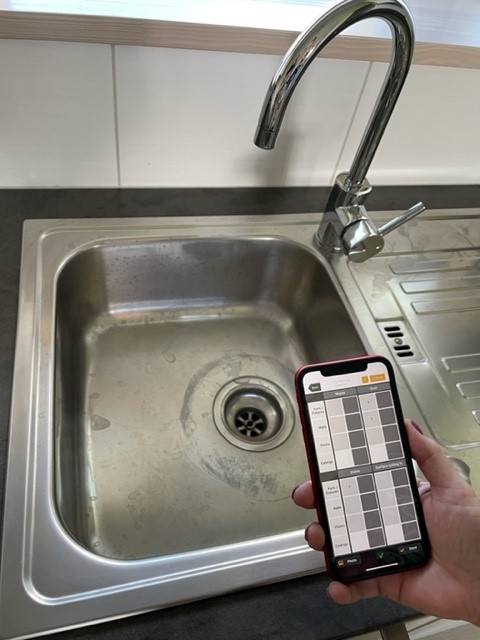info@puhastusekspert.ee +372 5611 1048
Impact of Dirt and Desired Cleanliness on Labor Time
Puhastusekspert is in its third year as the coordinator of the Erasmus+ cooperation project “Cost Effective, Need Based cleaning INSTA800”. The project’s goal is to exchange experiences among seven INSTA800 user countries and jointly develop new materials that contribute to the implementation of needs-based cleaning.

The largest part of the project involved conducting labor time tests, the aim of which was to determine how much achieving different quality levels according to INSTA800 affects labor time. The aim was to find out how a one-level higher quality standard or one level more dirt before cleaning affects labor time. Tests were conducted when cleaning five typical rooms: an office, a restroom, a classroom, a corridor, and a staircase. A total of over 800 tests were conducted. These took place in Estonia, Finland, Sweden, and Latvia. To our knowledge, there are no other such extensive studies that examine the impact of dirt presence and quality level on labor time, using real-life cleaning examples. Therefore, this is an important and valuable study, the results of which are very interesting and useful. In addition to defining labor time, several other instructive aspects emerged during the tests. A comprehensive report has been compiled on the labor time tests, containing important data and advice for cleaning service providers, service buyers, and all other specialists in the cleaning sector. The report can be found HERE.
Key conclusions in brief:
- A one-level higher quality standard or one level more dirt before cleaning affects labor time by 10 – 30%. Labor time is the largest cost factor in cleaning services, so it is important for both service providers and buyers to consider the impact of quality level and soiling on labor time. It is important to define needs-based quality levels, monitor their achievement, and avoid defining higher levels just in case. If the intensity of room usage changes during the service period, for example, if pets are suddenly allowed at work, this will generate more dirt. The square meters to be cleaned remain the same, but the labor time for the cleaning service to achieve the agreed quality level may be significantly longer.
- It is important to define needs-based cleaning frequency. Rooms are cleaned when they are soiled to an extent that may begin to interfere with daily activities. Often, attempts are made to compensate for poor quality cleaning with more frequent cleaning. Doing lower quality work more frequently does not improve the situation. It is important that after cleaning, rooms are clean to the agreed level, and it is monitored how quickly dirt accumulates that should not be there.
- The awareness of cleaning managers and cleaning operatives is a key issue, both regarding cleaning techniques and INSTA800. For example, tests conducted in Sweden revealed that a skilled cleaning operative achieved the desired result in 33% less time.
- A lot of time is spent on cleaning activities that do not remove dirt or create value. For example, clean surfaces are often cleaned because people are accustomed to routine tasks. This is a needlessly wasted resource. An important challenge is to minimize such tasks, but this requires awareness.
- The use of incorrect cleaning methods is costly and can make the situation even worse. For example, excessively wet methods, excessive chemical dosing, and similar practices create surface dirt.
It is important to notice which areas are dirty and to understand what dirt needs to be removed to achieve the desired quality level. When removing unwanted dirt, awareness is crucial – selecting and using the appropriate method, chemical, and accessory for the specific dirt. The awareness of the cleaning operative and the cleaning manager is the key issue. Since cleaning operatives are often a transient workforce, it is important for the cleaning manager to be able to guide and train cleaning operatives to act based on needs. Therefore, cleaning managers’ cleaning technical and INSTA800-related awareness becomes crucial in providing cleaning services. Based on the test results, 30-50% of the actual labor time that cleaning operatives need to clean a site may depend on the cleaning manager’s ability to guide them. Often, there is too little labor time for cleaning, but adding time and performing inefficient activities does not improve the outcome.